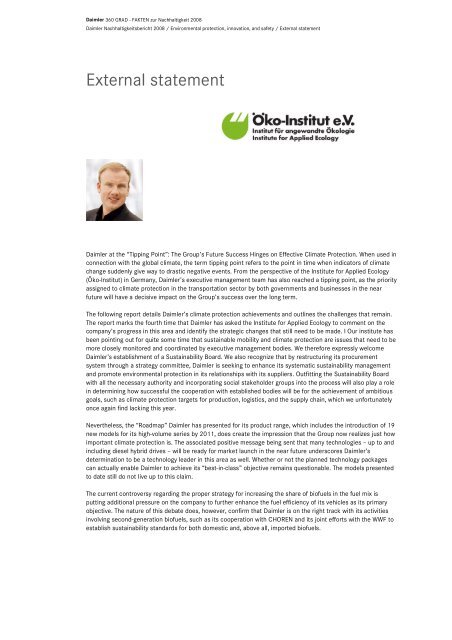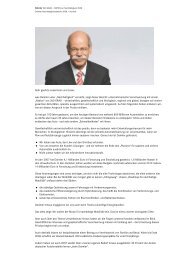Dear readers, This report describes what Daimler means by ...
Dear readers, This report describes what Daimler means by ...
Dear readers, This report describes what Daimler means by ...
You also want an ePaper? Increase the reach of your titles
YUMPU automatically turns print PDFs into web optimized ePapers that Google loves.
<strong>Daimler</strong> 360 GRAD - FAKTEN zur Nachhaltigkeit 2008<br />
<strong>Daimler</strong> Nachhaltigkeitsbericht 2008 / Environmental protection, innovation, and safety / External statement<br />
External statement<br />
<strong>Daimler</strong> at the “Tipping Point”: The Group’s Future Success Hinges on Effective Climate Protection. When used in<br />
connection with the global climate, the term tipping point refers to the point in time when indicators of climate<br />
change suddenly give way to drastic negative events. From the perspective of the Institute for Applied Ecology<br />
(Öko-Institut) in Germany, <strong>Daimler</strong>’s executive management team has also reached a tipping point, as the priority<br />
assigned to climate protection in the transportation sector <strong>by</strong> both governments and businesses in the near<br />
future will have a decisive impact on the Group’s success over the long term.<br />
The following <strong>report</strong> details <strong>Daimler</strong>’s climate protection achievements and outlines the challenges that remain.<br />
The <strong>report</strong> marks the fourth time that <strong>Daimler</strong> has asked the Institute for Applied Ecology to comment on the<br />
company’s progress in this area and identify the strategic changes that still need to be made. I Our institute has<br />
been pointing out for quite some time that sustainable mobility and climate protection are issues that need to be<br />
more closely monitored and coordinated <strong>by</strong> executive management bodies. We therefore expressly welcome<br />
<strong>Daimler</strong>’s establishment of a Sustainability Board. We also recognize that <strong>by</strong> restructuring its procurement<br />
system through a strategy committee, <strong>Daimler</strong> is seeking to enhance its systematic sustainability management<br />
and promote environmental protection in its relationships with its suppliers. Outfitting the Sustainability Board<br />
with all the necessary authority and incorporating social stakeholder groups into the process will also play a role<br />
in determining how successful the cooperation with established bodies will be for the achievement of ambitious<br />
goals, such as climate protection targets for production, logistics, and the supply chain, which we unfortunately<br />
once again find lacking this year.<br />
Nevertheless, the “Roadmap” <strong>Daimler</strong> has presented for its product range, which includes the introduction of 19<br />
new models for its high-volume series <strong>by</strong> 2011, does create the impression that the Group now realizes just how<br />
important climate protection is. The associated positive message being sent that many technologies – up to and<br />
including diesel hybrid drives – will be ready for market launch in the near future underscores <strong>Daimler</strong>’s<br />
determination to be a technology leader in this area as well. Whether or not the planned technology packages<br />
can actually enable <strong>Daimler</strong> to achieve its “best-in-class” objective remains questionable. The models presented<br />
to date still do not live up to this claim.<br />
The current controversy regarding the proper strategy for increasing the share of biofuels in the fuel mix is<br />
putting additional pressure on the company to further enhance the fuel efficiency of its vehicles as its primary<br />
objective. The nature of this debate does, however, confirm that <strong>Daimler</strong> is on the right track with its activities<br />
involving second-generation biofuels, such as its cooperation with CHOREN and its joint efforts with the WWF to<br />
establish sustainability standards for both domestic and, above all, imported biofuels.














